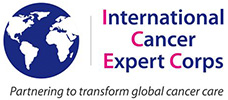Twinning Programs and the ICEC 5-Step Progression Plan for Global Cancer Care©
ICEC was created in response to recognition by the World Health Organization and United Nations that the burden of non-communicable diseases, including cancer, is increasingly falling on low-and middle-income countries. Over 60% of the cases of cancer will occur in these underserved settings where resources may be poor to non-existent. The burden of cancer impacts not only the lives of patients and their families but also communities and countries because of the huge physical, emotional, financial and political toll.
ICEC is a network-oriented global partnership that emphasizes sustainability and growth through ICEC’s “Twinning Programs”. A twinning program is a collaborative relationship between a university department or cancer program (or private practice) in an upper-income country (an ICEC Hub with ICEC Experts) and a cancer program/facility in a low- or middle-income country (an ICEC Center with ICEC Associates). This capacity building strategy facilitates the creation of a sustainable platform for the sharing of best practices and learnings from each other through information and technology transfer. The ultimate aim is for the ICEC Centers and Associates to progress to become ICEC Hubs and Associates for their specific regions.
Using a three-fold approach, ICEC’s program encourages resource-appropriate cancer care using guideline-and protocol-based education, training and treatment in resource-poor settings by:
- enlisting Hubs of Expertise to include academic medical centers/universities, private practices and an ICEC Central Hub
- enrolling Expert-Mentors affiliated with a university, practice or ICEC Central Hub including Individual physicians and other necessary allied healthcare workers, Global Health track practitioners and retirees
- identifying Centers – clinics/hospitals/and other care delivery sites in underserved areas, and Associates – physicians/allied healthcare workers seeking mentoring and education to guide development of cancer care to reach global standards. As expertise of Associates and Centers grows, Associates achieve Expert-Mentor status and Centers become Hubs.
ICEC 5-Step Progression Plan for Global Cancer Care©
Associates/Experts/Centers/Hubs
This 5-Step Plan is a tool for rostering ICEC supported Hubs-Centers programs and Expert-Associate mentoring relationships as we partner with existing programs and as we roll out new projects. This initial “system” of steps toward progression provides metrics of incremental improvement. However, ICEC continues to improve upon details as programs advance.
To track the current stages and progress of individual supported programs, and to evaluate new programs, ICEC categorizes existing and new “twinning” Hubs and Centers using this framework to determine gaps that exist. This information helps prioritize our efforts to assemble mentor teams for mentees on the ground as well as to garner financial support for individual organization’s participating Experts and Associates. As each twinning program is unique, specific implementation requirements will vary. Program progression and set periodic assessments/evaluations will be specified in program metrics established in Step 1. Priority disease states to include: cervix cancer, lymphoma, breast cancer, lung and head and neck cancer, and palliative care.
Step 1 Associates and Centers Establish ICEC Relationship
Step 2 Finalize ICEC Expert Commitments and Initiate Mentoring
Step 3 Demonstrate Protocol-based Patient Care; Join Global Oncology Activities
Step 4 Becoming a Recognized Regional Cancer Center
Step 5 Approaching Independence; Progress to Become an ICEC Hub
For more information, contact ICEC at info@iceccancer.org or call 202-478-1928

